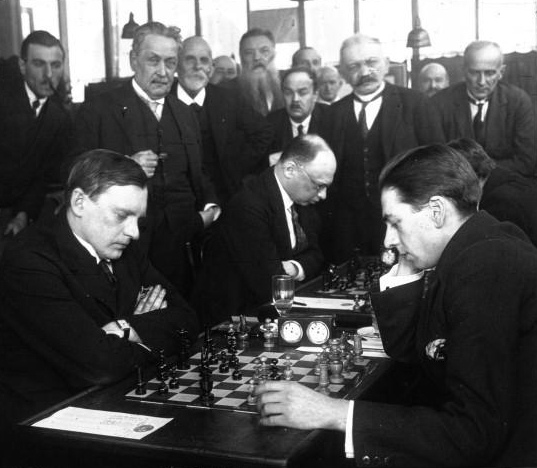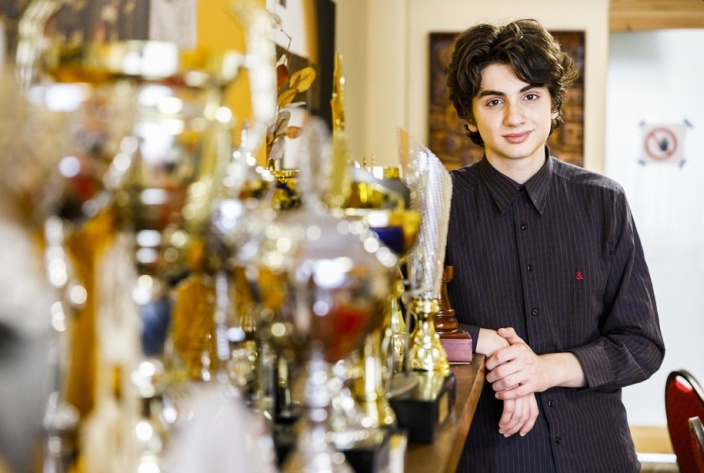Chess tradition in Belgium started long before the creation of the national chess association. Like all the major cities, Brussels already had a chess café in the 19th century, the Café de l’Europe, which housed a chess club in 1815, and the chess enthusiast will have analyzed the games played during the several tournaments of Ostend at the beginning of the 20th century.
Roughly a hundred years ago, on 17 December 1920, representatives of the leading clubs in the country, namely from Antwerp, Ghent, Liège, and Brussels gathered in the ‘Cercle des Échecs Bruxelles’ for a special occasion. They signed the statute establishing the Belgian Chess Federation!
The first secretary of the newly born chess federation, Edmond Lancel, would later publish the famous Belgian chess magazine ‘L’Échiquier’ with regular contributions from Alekhine, Réti, and Tartakower (1925–1939).
The foundation of the Belgian Chess Federation in 1920 also proved beneficial for the inception of FIDE four years later. The Belgian representative Léon Weltjens became a co-signatory of the FIDE Statute in Paris in 1924, and the Belgian chess champion, Edgard Colle, impressed with a third place in the first amateur world championship.
 Colle (right) against Alekhine in 1925 Photo: Agence de presse Meurisse – Bibliothèque nationale de France
Colle (right) against Alekhine in 1925 Photo: Agence de presse Meurisse – Bibliothèque nationale de France
Colle would also become a regular fixture in international professional tournaments, but his premature death in 1932 prevented him from putting Belgium among the leading chess nations in Europe.
Belgian chess history has been characterized by three main aspects:
First, our enormous flexibility and adaptability. In our small country, the political situation has never been simple and when the country was split into three language communities in 1970, this naturally also had an impact on chess. Three regional federations were founded under the national federation, each of which must abide by regional rules and decisions. Chess is for example only recognized as a sport in the German-speaking community, not in the other ones and, for some years now, the Ministry of Education in the French-speaking community has allocated a considerable amount of money to the development of chess in schools, but again, not the Ministries of Education in the other communities. Difficult, of course, to plan a national policy under those circumstances.
Secondly, our entrepreneurial spirit. It is no surprise that Belgians are keen to make an international contribution, such as Willy Iclicki (Chief Operating Officer at FIDE), Patrick Van Hoolandt (president of the A.I.D.E.F., the international French-speaking chess association) and other Belgians who promote chess in the various commissions of FIDE and ECU. And what about other Belgian ‘products’: Houdini, the chess program, and Thinkers Publishing, one of the best chess editors in the world. Is it therefore a surprise that – even without having real top players – we also manage to organize big tournaments: Spa 1926, Liège 1930, Antwerp 1932 and Ostend, again, in 1936–1937? In the less distant past, the top elite in chess came to play in the Lost Boys (Antwerp), the Swift tournaments (Brussels), and the Grand Chess Tour (Leuven). And even the youth can play in ideal conditions: the organizers of the Belgian Youth Chess Champions make use of about 120 electronic chess boards.
Our Burgundian lifestyle is certainly a third element that reflects in our world of chess. The habit of offering something to drink before a game (and more than one drink after it) is something that surprises players coming from abroad. And our tournaments are not only for chess lovers but also for life lovers. Why not play the tournament of Ghent during the festivities in the city, or Bruges with its beautiful decor, or Charleroi with its relaxed atmosphere? Brasschaat offers its conviviality and Liège its warm hospitality.
Is it our lifestyle that made a lot of players settle in Belgium? Victor Soultanbeieff and Georges Lalevitch, the unfortunate Akiba Rubinstein, and later, top trainer Vladimir Chuchelov and Michail Gurevich came to Belgium and even Magnus Carlsen went to an international school in Belgium when he was 7. Did he develop some necessary skills to become World Champion here?
Our contribution at the chessboard may not be underestimated either: we mentioned Colle already, who gave his name to a rock-solid opening, and Jadoul gave his name to a variation in the Scandinavian, but Belgians are also known for their problemists. And did you know we even have a world champion? Indeed, in 2017 Daniel Dardha (pictured below)has become the U14 world champion blitz, and two years later, he even became the youngest national champion at the age of 13 years…
 Photo: Gazet van Antwerpen (gva.be)
Photo: Gazet van Antwerpen (gva.be)
In short, the Belgian chess federation is 100 years old, but still alive and kicking.
Text: Philippe Vukojevic, RBCF Board Member







